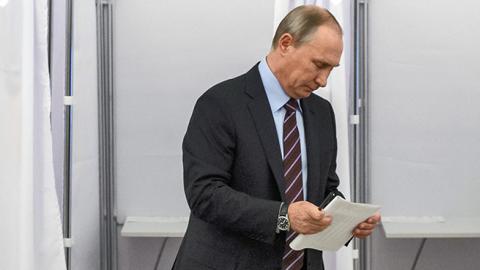Not so long ago, local and regional elections in Russia would have been closely watched, speculated and commented upon by Kremlin watchers outside the country. Would this be the year major cities would turn against Vladimir Putin? How many deputies unaffiliated to the regime’s four approved political parties would be elected to local councils? Will Russia ever again elect a regional governor who is a member of the besieged political opposition? How many votes will Putin’s party steal this time?
But as Vladimir Putin’s rule inches closer to its second decade, many Russia-watchers and commentators seem to have become as jaded as the Russian citizens who no longer bother to vote in these exercises. By now, they have reported and commented on elections in Russia a dozen times before, and the story lines never change: the Kremlin disallows popular candidates on the ballot; opposition leaders then mobilize activists to run for local council seats; the results are fixed by the regime in favor of Putin’s United Russia party, but perhaps for the amusement of those observers, the regime doles out a few consolation seats to those recruited activists who are immediately isolated by the overwhelming weight of the party in power. The faces tend to change, the formula does not.
There was little reason to suspect that the pattern would be interrupted in Sunday’s local elections. And in most of the country, the pattern held true to form: opposition rivals were barred from ballots, turnout was generally low; United Russia won the majority of seats on local councils; regime-backed governors were elected or re-elected, and election violations were numerous.
In Moscow, however, the usual script was somewhat upended. Yes, United Russia still won over 75% of the local council seats. But a closer look suggests that all is not well for Putin’s Moscow.
Moscow is divided into 100 administrative districts. The political opposition won a majority of seats on the local councils in fourteen of those districts. In the whole of the city of Moscow, opposition factions claimed victory in 266 seats in 62 different Moscow districts. Yabloko, the long-time democratic opposition party now headed by Emilia Slabunova, increased their number of council seats in Moscow by well over 1,000 percent, from 15 to 176. Other seats were won by the “Solidarity” opposition coalition led by Ilya Yashin.
In some parts of Moscow, the regime’s hold on local councils was completely upended. In the Krasnocelskiy district, Yashin’s Solidarity said it had won seven seats while United Russia won three. Before the recent election, that council was controlled 100% by United Russia and the Communist Party. In the neighborhood where President Vladimir Putin is registered to vote, the opposition is reported to have captured all twelve of the available council seats. The wealthy Tverskaya district next to the Kremlin saw eleven of its twelve seats go to opposition candidates.
This was Moscow’s first local election since the 2013 mayoral election when the anti-corruption activist and politician Alexei Navalny unexpectedly won 27.2 percent of votes. Perhaps afraid of seeing more such results, Sunday's elections were not widely publicized in Moscow and city officials have been accused of taking measures to depress the vote, in some places neglecting to publicly post voting locations. The total turnout in Moscow was a miserable 14.8 percent, down by more than half from the 33.23 percent of Muscovites who voted in 2013’s mayoral election. But, many of those who did cast their ballots did so with purpose to make a statement in defiance of the ruling regime.
Unsurprisingly, opposition parties in Moscow were exultant at their success in the local elections. Some opposition-minded Muscovites have posted online their joy and tears at having learned the candidate they voted for actually won. But elation will not be enough. While these newly-elected democrats have pledged to get to work, and Yabloko leaders speak of their ambitions to run for Moscow mayor next September, the reality of further successes seems slim.
Presidential elections are approaching in early 2018, but it is highly likely that the Kremlin will, with impunity, ban popular opposition figures from participating. Yabloko's former leader Grigory Yavlinsky has spoken of his intent to challenge Putin for the presidency in March 2018, but the regime refused to allow him to take part in the last election in 2012. Mr. Navalny has already been banned from running.
At the end of the day, while there’s reason to hope that these results are a sign that change is possible, the stark reality remains that these small victories are likely all that the regime will permit. Expectations for true change as a result of next year’s presidential elections remain negligible.



















